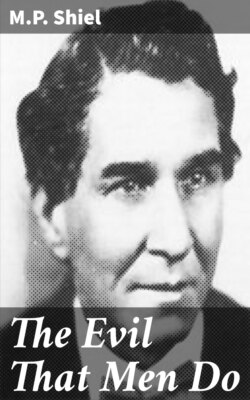Читать книгу The Evil That Men Do - M.P. Shiel - Страница 3
На сайте Литреса книга снята с продажи.
Оглавление"
I. — ON THE SEA
Table of Contents
An interesting question raised by the incident we have to tell is this: How far is it true that children inherit the traits of their parents? The son, the father—a racehorse is usually a racehorse; but is the son, the father, a Napoleon, a Napoleon? On the contrary, history teaches that no great man ever had a great son.
A child's resemblance to its parents may sometimes arise after its birth; for constant intimacy is alone sufficient to produce resemblance. Thus, the late President McKinley came to look like his wife's brother; and so with many couples.
For years the child's existence is all mixed up with its parents'. How many kisses, forbidden hours of sleep in the drowsy mother's bed! Therefore, if either parent has a disease, the child can hardly escape. Later on he will be told that his consumption is "hereditary," but it may have originated since his birth.
No one would question the fact of heredity: we only remark that the extent to which we now believe in it is "not proven" in the case of that mysterious animal, man; and we are led to the reflection by a singular case which happened on board a ship some forty five years ago.
She was the Africa, and was one of those Union line mail boats that ply between the Cape and Southampton before the Castle line was formed to share with the Union line half the Government subvention, about 1870. They were small boats (compared with the present monsters) of 1,000 tons or so, of the kind which it was the fashion to call "tin-kettles:" half steamer, half sailing-ship, brigantine-rigged, with one funnel; and the postage of a letter to the Cape was—one shilling.
The captain of the Africa—a certain Captain Denner—was a handsome man of forty, with a large freckled face, who might have done very well for a model of Charlemagne, or some old sea-king, only that his long beard was black. He had a red birth-mark, the size of a penny, across his left temple. His lips were rather thick, and his moustache, parting in the middle, showed their strong pressure there. Though rather taciturn at times he was a good captain, popular with the passengers: and the voyage went well, till they reached the latitude of Madeira. At that time, by the way, it lasted thirty days, not sixteen, as now.
One Sunday morning, then, near Madeira, the vessel moving through a calm sea, the passengers were assembled at prayers, which were conducted by a clergyman who happened to be aboard. Among them were two ladies, a Mrs Drayton and a Mrs Hartwell, both of whom were about to become mothers.
It was noted as an odd thing that the captain was not at the service; no one, in fact, had seen him at all that morning. The first officer had knocked at his door, but the captain, without opening, had called back, in a strange voice, the strange words: "Go away."
However, the clergyman had not yet reached the Litany, when the captain appeared at the door of the dining-saloon, where the worshippers were. Their backs were turned to the door, but when the clergyman stopped, with gaping mouth, the others looked round and saw the captain.
He had on nothing but a shirt and drawers. Some open ports, with a wellhole communicating with the smoke-room above, gave plenty of light, and he was distinctly seen: his rich, black hair seemed to stand on end, his eyes were wild, and in his hand was a revolver.
As all stared at this apparition he lifted his right arm, uttered the sound "bang," and shot the clergyman dead. He then turned the weapon a little, uttered the same sound, and sent another into eternity. The third shot pierced Mrs Drayton's right forearm; the fourth wounded the purser in the breast; the fifth killed a passenger who was running to seize the madman. This scene somehow affected the witnesses of it, not merely with terror, but with some sort of ghostly awe, which left all the survivors, male and female, in a state of nervous ruin for days. Before the fifth shot, all the ladies had fainted.
A rush, however, was made by the men, the lunatic was mastered, put into irons, and died the same night of the brain disease which had suddenly seized him.
Four months afterwards, in the town of Bradford, Mrs Drayton gave birth to a son; six months afterwards, near Rugby, Mrs Hartwell too, gave birth to a son. And the point which we wanted to emphasize is this, that these two boys, as they grew to manhood, bore no resemblance to hereditary types; but each had a raspberry birthmark the size of a penny on his left temple; and each was the image of Captain Denner, the captain of the Africa.
In that instant of the captain's apparition at the saloon door in that one vivid shock of panic, the nervous beings of the two mothers had leapt, caught, appropriated, and kodaked the captain's image.
And for thirty-eight years after that Sunday on the sea those two portraits of the captain of the Africa lived in England unconscious of each other. But after that stretch of time, the winds that blew the lives of men like wandering waves of the sea, blew them together, and they met.
